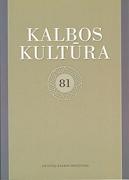Dėl sekančio klausimo
On the use of sekantis
Author(s): Dainius RazauskasSubject(s): Language and Literature Studies
Published by: Lietuvių Kalbos Institutas
Keywords: Participle; sekantis
Summary/Abstract: The paper gives an overview of the main claims of linguists on the abuse of the word sekantis. The author focuses on a single case of such use: the verb sekti in the meaning ‘to go after’ and the participle sekantis in the meaning of ‘going after’. More attention is given to different approaches of linguists to the use of the above words in such meanings. An attempt is made to provide arguments for their well-formedness in the following four ways: 1) by demonstrating that the distinction between the verb sekti in its main meaning of ‘to follow sb or sth’ and the meaning under discussion ‘to go after’ is arbitrary; 2) by focusing on the respective meanings of the derivatives of the word sekti: nuoseklùs, sekà (pãskui, pasku, paskutnis); 3) by investigating the action of “following” in logical terms; 4) by referring to the ordinary, typical use of equivalent words in other languages. The paper concludes that the word sekantis in the meaning of ‘going after’ should be accepted for use; it should also be noted that the collocation sekantis ką (Eng. ‘following what’) should be preferred over sekantis po ko (Eng. ‘following after sb/sth’), e. g. trečias puslapis yra sekantis antrąjį (Eng. page three follows page two) and therefore page three is the following in respect to page two.
Journal: Bendrinė kalba (iki 2014 metų – Kalbos kultūra)
- Issue Year: 2008
- Issue No: 81
- Page Range: 224-235
- Page Count: 12
- Language: Lithuanian

